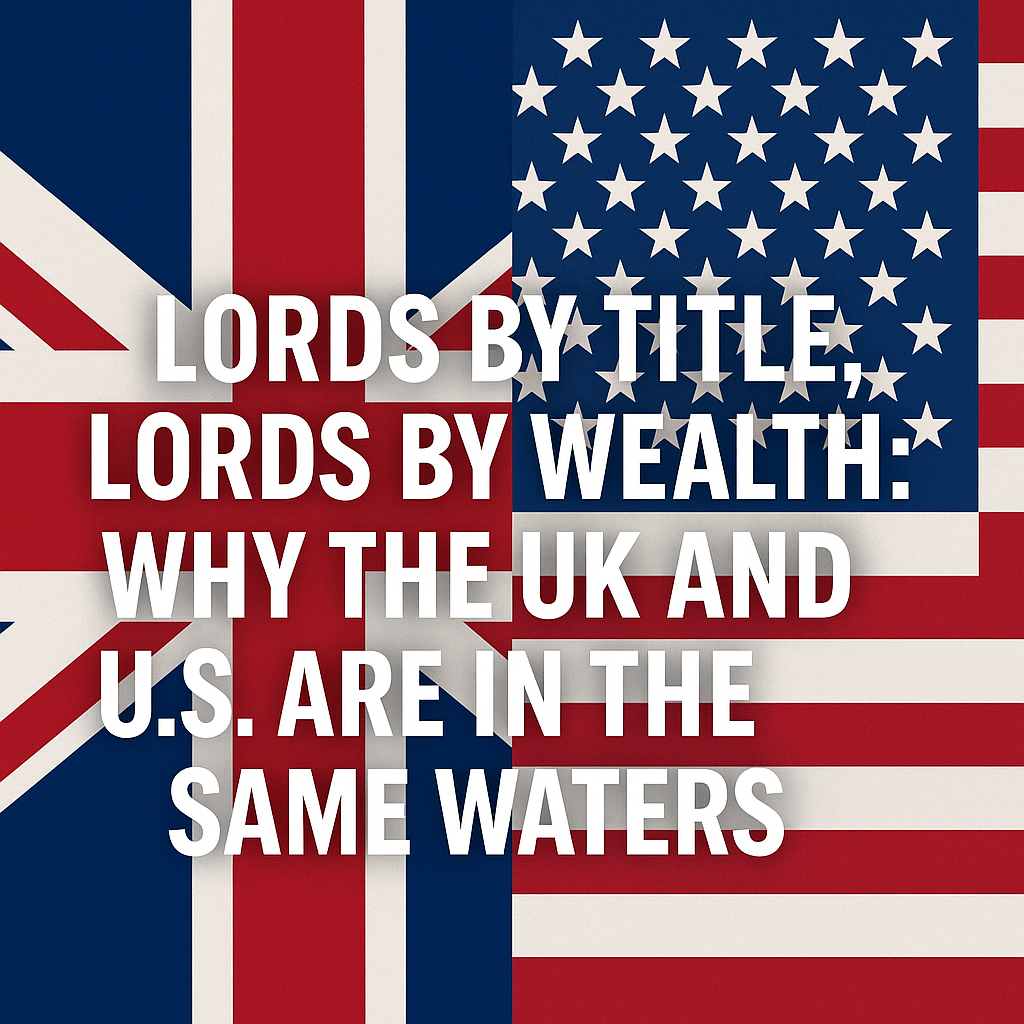
Campaign design team
Lords by Title, Lords by Wealth: Why the UK and U.S. Are in the Same Waters
By Vincent Cordova · Candidate for U.S. President 2028
“When the people of the UK and U.S. unite to change a system that is United against us” — Vincent Cordova
When we look across the Atlantic, it may seem like the United Kingdom and the United States are worlds apart in how they govern. The UK has a monarchy, a House of Lords, and an unwritten constitution. The United States has an elected presidency, a written Constitution, and a Supreme Court meant to check government power. On paper, these two nations could not be more different. And yet, when we examine the outcomes, we see the same picture: poverty in the midst of plenty, ownership stripped away from families, speech policed while housing and stability collapse, and ordinary citizens left powerless while elites entrench themselves further.
In the UK, the existence of the House of Lords itself reveals just how outdated the system is. Here sits an unelected chamber of aristocrats, bishops, and political appointees, some holding seats simply because of the family they were born into. These Lords are not chosen by the people, cannot be removed by the people, and yet help shape laws that bind every citizen. In a nation of fewer than seventy million people, this concentration of authority among the few is staggering. And at the very same time, millions in Britain live in poverty, and hundreds of thousands of children are housed in temporary or insecure accommodations. The people who most need stability are offered speeches and scrutiny, while the unelected elite preserve traditions that serve no purpose but their own influence.
The United States does not have hereditary peers, but it does not need them. We have created our own class of modern Lords through money, lobbying, and corporate capture. In theory, sovereignty belongs to the people, protected by the Constitution. In practice, influence is bought and sold through donations, super PACs, and revolving doors between corporate boardrooms and government offices. The same private equity firms that dominate British housing and utilities have quietly bought up American homes, hospitals, nursing facilities, and even prisons. They do not inherit their seats like a British Lord, but they inherit control through wealth, connections, and systems designed to ensure that profit comes before people.
The outcome is nearly identical in both nations. Families are becoming renters, not owners, as corporate landlords and investment funds acquire property at massive scale. Wages stagnate while housing costs soar, ensuring that poverty is not just a misfortune but a manufactured condition. Governments talk endlessly about “protecting people from harmful speech,” but somehow never find the urgency to protect families from homelessness, debt, or hunger. Resources exist, but they are siphoned upward. Political energy is spent managing expression, not ensuring survival. In this design, the people are always third, and the elite — whether titled or not — remain first.
When two nations with such different structures produce the same results, we must ask ourselves what is really happening. The answer is clear: the system of control is above the system of government. It does not matter whether a Lord sits in an inherited seat or a CEO sits in a corporate boardroom. Both hold power unaccountable to ordinary citizens. Both profit from dependency. And both thrive when people believe they are powerless to change it. What we are witnessing is not democracy in either country, but a softer form of colonization — not by foreign armies, but by global wealth and domestic elites who have learned to treat nations as markets and citizens as consumers.
This truth is uncomfortable, but it is also liberating. If the outcomes are the same, then the struggle is the same. A worker in Birmingham, England, is bound by the same economic chains as a worker in Birmingham, Alabama. A family paying half their paycheck in rent in London is suffering under the same design as a family doing the same in Los Angeles. These are not separate stories. They are chapters of the same book — one written by elites, but one that can be rewritten by the people.
The task before us is not to envy one system or defend the other. It is to recognize that both are producing poverty, both are enforcing dependency, and both are silencing dissent while families go without. Ending this means restoring sovereignty where it belongs: not in a parliament, not in a corporation, but in the people themselves. It means ending the grip of private equity, exposing the lobbying networks that distort our laws, and reclaiming ownership — of homes, of communities, of futures.
The people of the UK deserve better than to live under Lords. The people of the U.S. deserve better than to live under corporate Lords. And together, we all deserve a world where government is not an instrument of control, but a tool of empowerment. We are in the same waters now, facing the same storm. But if we see clearly, and act together, we can chart a course to shore.